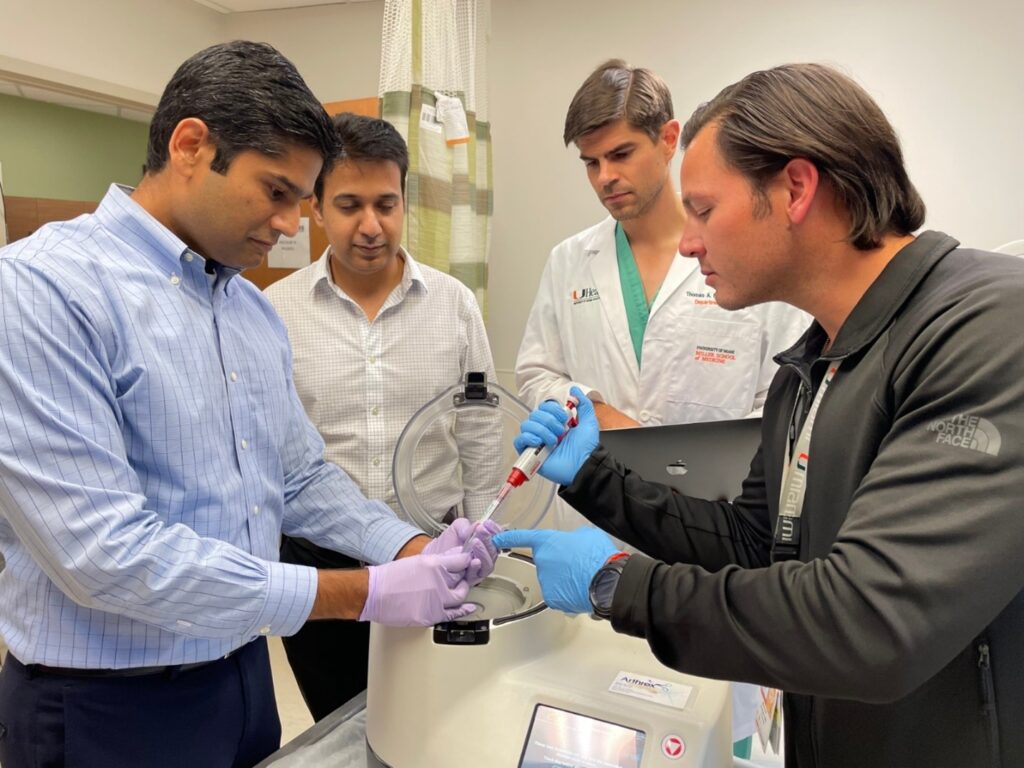 On University of Miami Miller School of Medicine Week: Do COVID-19 vaccines harm male fertility?
On University of Miami Miller School of Medicine Week: Do COVID-19 vaccines harm male fertility?
Ranjith Ramasamy, associate professor and director of reproductive urology, looks into this question.
Ranjith Ramasamy, M.D., is an associate professor and director of the University of Miami Miller School of Medicine Reproductive Urology program. His extensive research in male fertility has been documented in various peer-reviewed journals. His team was the first to publish scientific research that showed that the COVID-19 mRNA vaccines do not impact male fertility. Dr. Ramasamy is the second recipient of the Young Investigator Award of Excellence from the Sexual Medicine Society of North America. He was also the recipient of the Ira and Esther Rosenwaks New Investigator Award from the American Society for Reproductive Medicine in 2020. He is currently the recipient of a 3-year R01 National Institutes of Health (NIH) grant for a first-of-its-kind study for treating erectile dysfunction using a combination of platelet-rich plasma and shockwave therapy.
The Impacts of COVID-19 and its Vaccines on Male Fertility
Even today, there remains a lot of misinformation and hesitation surrounding COVID-19 vaccines and how they might affect male fertility. The only way to find out if these claims were viable was to conduct our own research. In 2021, we published a study in the Journal of the American Medical Association, known as JAMA, that showed that the Pfizer and Moderna mRNA COVID-19 vaccines are safe for male reproduction.
Study participants between the ages of 18 and 35 who had no fertility issues provided a semen sample before receiving their first dose of either vaccine. They then provided another sample 70 days after their second dose.
The full life cycle of sperm is 70 days which gave us sufficient time to see if the COVID-19 vaccines impacted semen parameters. We measured semen volume, sperm concentration, and the total amount of moving sperm and found there were no declines in any of these parameters as compared to the baseline analysis.
In fact, other research we conducted and published in the World Journal of Men’s Health showed that it is the COVID-19 virus itself can remain present in the penis long after recovery. COVID-19 can cause widespread endothelial dysfunction in organs beyond the lungs and kidneys, including the penis. As a result, the tissues supplied by those vessels could undergo damage which can potentially lead to erectile dysfunction. In addition, we also found that the COVID-19 virus can invade testis tissue in some men which can potentially impact male fertility.
Vaccine hesitancy is a barrier to ending this pandemic and we believe that some of that hesitancy is due to public opinion on fertility. Ultimately, our goal is to scientifically demonstrate that it’s actually the virus itself and not the vaccines that can impact male fertility.

Read More:

Comments
11 responses to “Ranjith Ramasamy, University of Miami – The Impacts of COVID-19 and its Vaccines on Male Fertility”